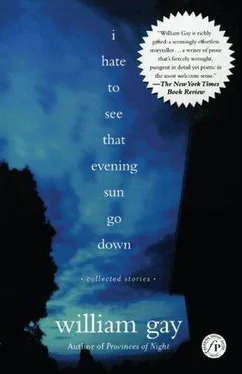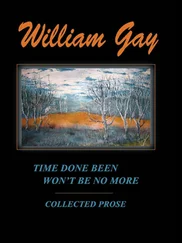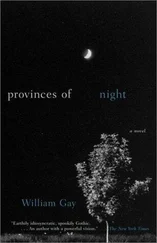Hey baby, Bonedaddy said. What you got in there? Why, I do believe it’s that new air conditioner I ordered.
He came across the grassy yard grinning at her. His teeth were white against the dark flesh of his face. He had swung out the cylinder of the revolver and he was feeding copper-colored cartridges into it as he came. He was wearing sunglasses, the mirrored kind that turned the world back at you and she could see herself twinned in them.
Clarence told me what you said about me.
What I said? Who knows what that might be. Clarence is a terrible liar. Ain’t you Clarence?
I lie all the time, Clarence agreed.
I hope you kill somebody with that thing and they send you to the penitentiary, Quincy Nell said. I hope they send you to the electric chair.
Boy the cold wind’ll blow on me tonight, he said. I feel a cold front approaching already.
Don’t even think about taking that air conditioner.
Clarence, help me load it.
Clarence was looking at Quincy Nell. No, he said almost inaudibly.
Do what?
I ain’t touchin it, Clarence said.
Bonedaddy studied him for a moment. He laid the pistol on the tailgate of Clarences truck. Suit yourself then. I’ll load it my damn self.
He strode to the rear of the Gremlin. He fastened a hand to either side and gave a mighty heave and the air conditioner came free and he turned tottering under its unexpected weight and grinning foolishly. When he came around in the road Quincy Nell was standing against the tailgate of Clarence’s truck pointing the little chrome-plated pistol at him. She was standing feet apart and arms extended straight out holding the pistol both-handed and staring down its barrel.
Put it back in my car, she said.
He stood with his jaw dropped and the thing clasped in front of him like some curious and inadequate offering he was making. You stupid cunt, he finally said.
Quincy Nell could see herself in the sunglasses. She could feel the hard hot edge of the tailgate against the flesh of her upper thighs.
Clarence had started to run. He ran silent and intent, like a quarterback who sees an opening and takes it, across the grassgrown yard and into the sedge leaping a cast-off turning plow and disappearing into a thin spinney of cypress. The first shot whanged off the steel case of the air conditioner and shattered the point of Bonedaddy’s collarbone. It exploded in a fine pink mist and he dropped the air conditioner on his feet. The corner of the case struck his shin just below the knee and cut a long curving welt in his leg. He looked as if he was struggling to pick up the air conditioner. She shot him just below the left nipple and a tiny blue hole appeared, another, another, little pocks in the dark flesh where blood slowly welled black and viscous as tar and tracked down his rib cage. He sat in the road hugging the air conditioner. She lowered the gun. She stepped toward him and sat in the dusty road. His eyes were closed. She clasped the pistol loosely in her right hand and with her left forefinger traced the pale line of scar tissue down his cheek.
Up the road at the doublewide Clarence’s mother came out to see what in the world was going on. She shaded her eyes with a hand and peered down the road. Then she went back in and the door slapped hard behind her.
Quincy Nell sat in the dust, her legs folded under her. The back of her right hand lay in the roadbed, the little pistol resting on her palm. She could hear the Gremlin idling. She guessed she’d just have to sit here until someone came along who knew what to do about all this.
T HE VANISHING of the doctors wife’s child in broad daylight was an event so cataclysmic that it forever divided time into the then and the now, the before and the after. In later years, fortified with a pitcher of silica-dry vodka martinis, she had cause to replay the events preceding the disappearance. They were tawdry and banal but in retrospect freighted with menace, a foreshadowing of what was to come, like a footman or a fool preceding a king into a room.
She had been quarreling with the paperhanger. Her four-year-old daughter, Zeineb, was standing directly behind the paperhanger where he knelt smoothing air bubbles out with a wide plastic trowel. Zeineb had her fingers in the paperhanger’s hair. The paperhanger’s hair was shoulder length and the color of flax and the child was delighted with it. The paperhanger was accustomed to her doing this and he did not even turn around. He just went on with his work. His arms were smooth and brown and corded with muscle and in the light that fell upon the paperhanger through stained-glass panels the doctor’s wife could see that they were lightly downed with fine golden hair. She studied these arms bemusedly while she formulated her thoughts.
You tell me so much a roll, she said. The doctor’s wife was from Pakistan and her speech was still heavily accented. I do not know single-bolt rolls and double-bolt rolls. You tell me double-bolt price but you are installing single-bolt rolls. My friend has told me. It is cost me perhaps twice as much.
The paperhanger, still on his knees, turned. He smiled up at her. He had pale blue eyes. I did tell you so much a roll, he said. You bought the rolls.
The child, not yet vanished, was watching the paperhanger’s eyes. She was a scaled-down clone of the mother, the mother viewed through the wrong end of a telescope, and the paperhanger suspected that as she grew neither her features nor her expression would alter, she would just grow larger, like something being aired up with a hand pump.
And you are leave lumps, the doctor s wife said, gesturing at the wall.
I do not leave lumps, the paperhanger said. You’ve seen my work before. These are not lumps. The paper is wet. The paste is wet. Everything will shrink down and flatten out. He smiled again. He had clean even teeth. And besides, he said, I gave you my special cockteaser rate. I don’t know what you’re complaining about.
Her mouth worked convulsively. She looked for a moment as if he’d slapped her. When words did come they came in a fine spray of spit. You are trash, she said. You are scum.
Hands on knees, he was pushing erect, the girl’s dark fingers trailing out of his hair. Don’t call me trash, he said, as if it were perfectly all right to call him scum, but he was already talking to her back. She had whirled on her heels and went twisting her hips through an arched doorway into the cathedraled living room. The paperhanger looked down at the child. Her face glowed with a strange constrained glee, as if she and the paperhanger shared some secret the rest of the world hadn’t caught on to yet.
In the living room the builder was supervising the installation of a chandelier that depended from the vaulted ceiling by a long golden chain. The builder was a short bearded man dancing about, showing her the features of the chandelier, smiling obsequiously. She gave him a flat angry look. She waved a dismissive hand toward the ceiling. Whatever, she said.
She went out the front door onto the porch and down a makeshift walkway of two-by-tens into the front yard where her car was parked. The car was a silver-gray Mercedes her husband had given her for their anniversary. When she cranked the engine its idle was scarcely perceptible.
She powered down the window. Zeineb, she called. Across the razed earth of the unlandscaped yard a man in a grease-stained T-shirt was booming down the chains securing a backhoe to a low-boy hooked to a gravel truck. The sun was low in the west and bloodred behind this tableau and man and tractor looked flat and dimensionless as something decorative stamped from tin. She blew the horn. The man turned, raised an arm as if she’d signaled him.
Читать дальше












